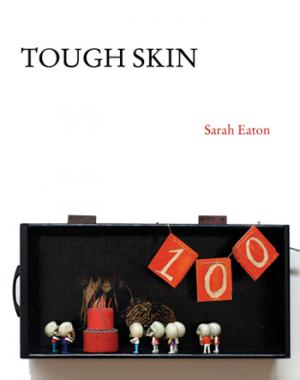Tough Skin

In this collection of prose poetry, Sarah Eaton takes her reader on a wild romp, stomping through delicate issues of incest, death, and the family with the care that might be accorded by a child as it destroys a garden of hitherto well-tended flowers. While she brings a dark sense of humour to themes that might more traditionally be described as horrific, she also manages to litter her gory stories with surprisingly familiar and endearing characters such as the drunken uncle, or the teenage candystriper (hospital worker, for the uninitiated). What strikes me as most interesting about this collection is not her dark humour, but how this approach is particularly effective at handling what seems to be the overarching theme of the book: care-work and the people who do it. Eaton’s world is one that exists on the edge of violence, which some might say is also where the work of care exists.
From the introductory story, of a man who describes his particular love and hate for his miscarried "blood baby" Peaches, to the "young, uneducated, and promiscuous" candystriper, to the chaperone who wonders if it is okay to give the girls back rubs and toe rings, to the midwife who explains that she must "quit before I kill someone," Eaton looks at the sometimes horrific ambivalence that comes with caring for another. Using these quirky characters, Eaton asks important questions about what it means to love and the uneasy way one might respond to being in charge of life and its sustenance. I was particularly touched by the story of the man whose fatherhood ends before it begins when his child is miscarried and his subsequent project to care for the creature that he has "conjured from nothing."
As a collection of poems about characters that care, Eaton’s style of horror-humour invites the reader to think about why we care and for whose benefit. Through the father who works to keep his Peaches alive, and the midwife who muses that perhaps it is better to be born blue "not ever having to breathe," Eaton offers a unique take on the familiar questions of love, life, and death. Far from seeing care as altruistic and always good, Eaton describes a world in which caring might indeed lean towards the horrific and violent.